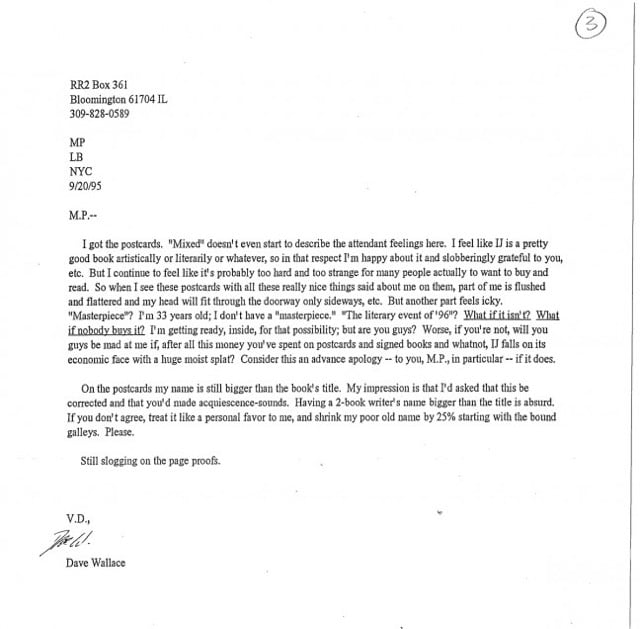David Foster Wallace’s Infinite Jest turns 20 years old this month. To mark the occasion, the Harry Ransom Center, home of DFW’s archive of papers, is posting some of the more interesting findings by visiting scholars. Here, for instance, is a letter written by Wallace to his editor a few months before IJ’s publication.

(via @john_overholt)
Update: In a NY Times essay adapted from his forward to an upcoming 20th anniversary edition of IJ, Tom Bissell reflects on why Infinite Jest still resonates 20 years later.
In interviews, Wallace was explicit that art must have a higher purpose than mere entertainment: “Fiction’s about what it is to be a … human being.” And here, really, is the enigma of David Foster Wallace’s work generally and “Infinite Jest” specifically: an endlessly, compulsively entertaining book that stingily withholds from readers the core pleasures of mainstream novelistic entertainment, among them a graspable central narrative line, identifiable movement through time and any resolution of its quadrumvirate plotlines. “Infinite Jest,” in other words, can be exceedingly frustrating. To fully understand what Wallace was up to, the book bears being read, and reread, with Talmudic focus and devotion. For many Wallace readers this is asking too much. For many Wallace fans this is asking too much.
This is an old piece from McSweeney’s, but it’s absolute gold and I can’t believe I’ve been missing it all these years. In it, Noam Chomsky and Howard Zinn record a DVD commentary for the first Lord of the Rings movie. So, so good.
Zinn: You’ve spoken to me before about Mordor’s lack of access to the mineral wealth that the Dwarves control.
Chomsky: If we’re going to get into the socio-economic reasons why certain structures develop in certain cultures… it’s mainly geographical. We have Orcs in Mordor — trapped, with no mineral resources — hemmed in by the Ash Mountains, where the “free peoples” of Middle Earth can put a city, like Osgiliath, and effectively keep the border closed.
Zinn: Don’t forget the Black Gate. The Black Gate, which, as Tolkien points out, was built by Gondor. And now we jump to the Orcs chopping down the trees in Isengard.
Chomsky: A terrible thing the Orcs do here, isn’t it? They destroy nature. But again, what have we seen, time and time again?
Zinn: The Orcs have no resources. They’re desperate.
Chomsky: Desperate people driven to do desperate things.
Zinn: Desperate to compete with the economic powerhouses of Rohan and Gondor.
Chomsky: Who really knows their motive? Maybe this is a means to an end. And while that might not be the best philosophy in the world, it makes the race of Man in no way superior. They’re going to great lengths to hold onto their power. Two cultures locked in conflict over power, with one culture clearly suffering a great deal. I think sharing power and resources would have been the wisest approach, but Rohan and Gondor have shown no interest in doing so. Sometimes, revolution must be —
Zinn: Mistakes are often —
Chomsky: Blood must be shed. I forget what Thomas Jefferson —
Here’s part two. And the same writers, Jeff Alexander and Tom Bissell, also did one for The Return of the King.






Stay Connected